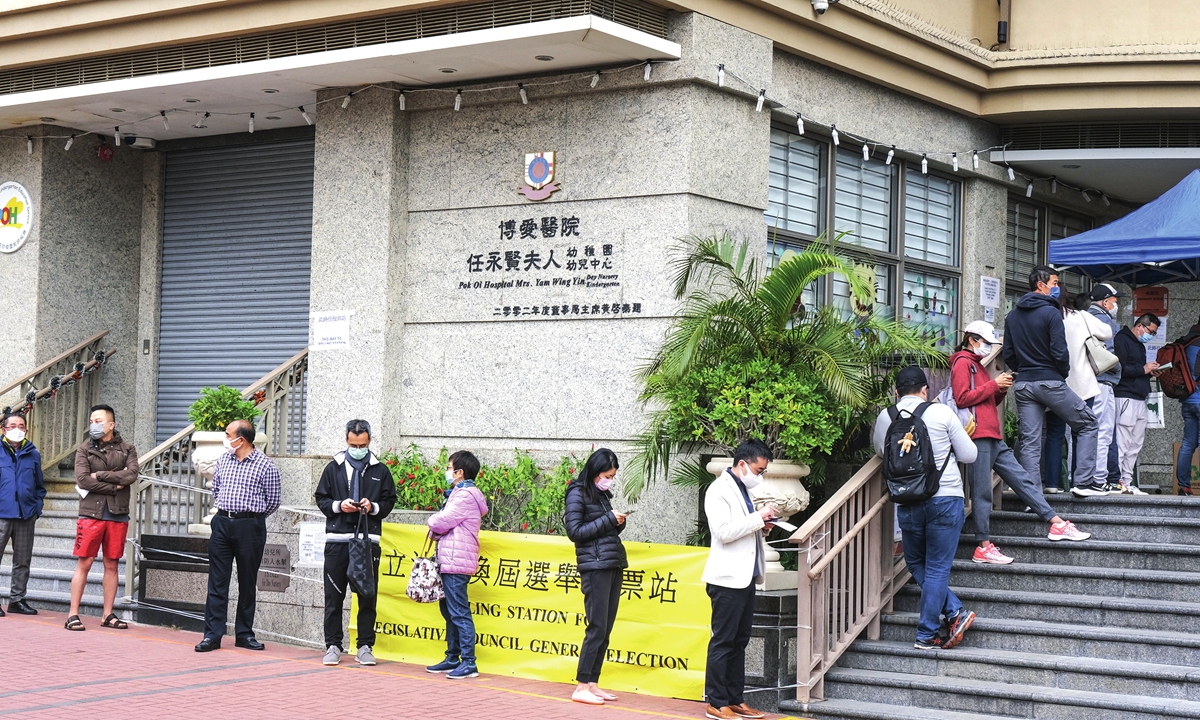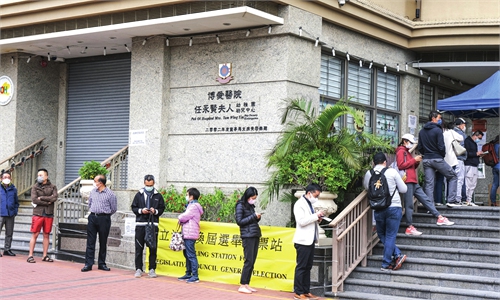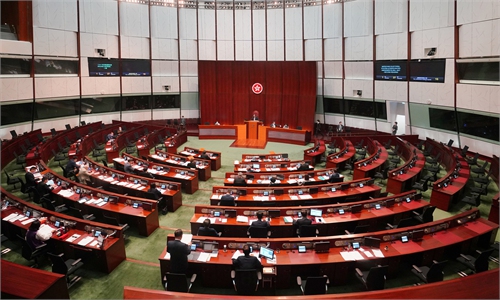LegCo election advances despite trivial noises, to bring HK into a new era
Sweeping out anti-China lawmakers, secessionists turn local governance into practical, effective phase

Voters line up outside a polling station at Whampoa in Hong Kong to cast their votes for the Legislative Council, the first election since the city implemented the electoral reform that ensures only patriots govern Hong Kong. Photo: Xinhua
No matter how hard some Western media outlets like The New York Times or the BBC tried to hype a "controversial" or "unfair" Legislative Council (LegCo) election that took place in Hong Kong on Sunday, dozens of Hong Kong residents, local officials and experts who talked with the Global Times consider the new election format - the first since the implementation of the national security law for Hong Kong and the electoral reform, as a milestone to bring the city into a new era with better governance after years of political battling in a vicious circle.
After most polling stations opened at 8:30 am, Carrie Lam, chief executive of the HKSAR government, was among the first batch of senior officials to cast their votes. They also called on the public to vote as soon as possible despite online noise made by absconded former lawmakers and secessionists like Ted Hui Chi-fung and Nathan Law Kwun Chung to instigate blank votes - a major way of defying the legitimacy of the election.
"Today's election is the first since the electoral reform took effect, which has great significance. My husband and I voted this morning to fulfill our responsibility as citizens, which is also casting the vote of confidence for Hong Kong's future," Lam told reporters.
Compared to the concrete action of the Hong Kong residents on Sunday, noises were trivial. Some Western media and foreign observers described "the electoral reform with the implementation of the principle of only patriots governing the city" as a way of "sidelining" or "cracking down" on the pan-democracy camp, especially after dozens of lawmakers who had been charged with conspiring to subvert state power and the rest of the pan-democratic candidates decided not to run as a way of "boycotting" it, but some observers said there is no need to take this noise seriously.
As times goes by, Hong Kong will embrace a bright future after addressing the root causes of the social turmoil in the past, they said.

Changes in HK LegCo election after electoral reform.Graphic:Global Times
Voting in order
As of 9:30 pm, 13 hours since polling stations opened, about 29.28 percent of Hong Kong's voters - or some 1.31 million people - had cast their votes, according to the latest official figures.
The voting for the election concluded at 10:30 pm, and Lam said the HKSAR government is confident that the 7th LegCo election and the first after the electoral reform can help increase the effectiveness of local governance, unveiling a new page for good governance.
She also thanked over 1.3 million voters, as every vote reflects their expectation for improving governance, and for authorities to better serve local economic development and social livelihoods improvement.
As there are no automatically elected seats for the first time in this election, every candidate competes with each other with their policy guidelines and 153 all have different backgrounds and political stances, which shows broad representation and balanced and fair participation.
Besides the absence of the pan-democratic candidates to the LegCo election, the relatively low turnout rate was cited by Western media and government critics as "evidence" showing that Hong Kong people "have little enthusiasm" as candidates from the opposition camp "were banned" from the election, reflecting its "unfairness."
"The turnout can be affected by many factors. When there are intense confrontations and social conflicts, or the public is unhappy with the government, the turnout could be relatively higher. Otherwise, it's not that high in a peaceful environment," Tam Yiu-chung, a Hong Kong-based member of the Standing Committee of the National People's Congress, told the Global Times on Sunday.
China's top lawmakers unanimously approved the electoral reform plan for Hong Kong in March, another major step following the implementation of the national security law for Hong Kong in fixing the loopholes in the city's governance structure.
In May, lawmakers in Hong Kong finalized amendments for the election overhaul which increased the seats in the LegCo from 70 to 90, including 40 seats from the Election Committee, 30 from functional constituencies, and 20 which are directly elected.
"I cast my vote this morning, and I think this first election after the electoral reform took effect has great significance, as I could feel high spirits around me," Victor Chan Chi-ho, vice chairman of the Hong Kong Association of Young Commentators, told the Global Times on Sunday.
As the process of voting has been streamlined this year by introducing electronic ballot distribution and setting up special lanes for elderly people and those who need special care, it only took a few minutes to cast his vote, Chan said.
Jack Ng, principal learner of Pui Kiu Middle School, cast his vote in his neighborhood at around 8:30 am. "The line was shorter than previous years," he said.
"Still, including myself, my friends have strong willingness to vote, as we all hope that the election would serve as a new page for Hong Kong," Ng told the Global Times on Sunday morning.
Due to COVID-19, it was also the first time that authorities set up polling stations at checkpoints on the Chinese mainland-Hong Kong border to facilitate the voting process for Hong Kong residents who live and work in the mainland.
Leon Xu Zuli, a Hong Kong resident who lives in the mainland, said he arrived at the border checkpoint around 10:30 am where there were about 200 people lined up to vote. "Some of my friends flew from Shanghai to Shenzhen to cast their votes despite some difficulties amid COVID-19, such as taking a 48-hour valid nucleic acid tests, but we're determined to do so for ourselves and for Hong Kong," he told the Global Times on Sunday.
It should be understood that the previous election method in Hong Kong was granted by the central government in accordance with the Constitution and the Basic Law, but problems emerged from the previous system given that LegCo went too far against the spirit of the Basic Law, becoming a stage for radical political wrestling, Fan Peng, a member of the Chinese Association of Hong Kong & Macao Studies, told the Global Times on Sunday.
"Those lawmakers abused their power to oppose to the country and to sabotage the rule of law, which wouldn't be tolerated in any country in the world," Fan said.
New LegCo
What will be the new LegCo look like? A number of former lawmakers including from the opposition camp, in addition to legal experts in Hong Kong and the mainland came up with a consensus that it should be a place with diverse voices and broad representation. More importantly, it is a place to find common ground and practical solutions for Hong Kong's economic and social development rather than making troubles, like some anti-government lawmakers did in the past to obstruct over 100 bills by filibustering.
Tik Chi-yuen, former vice chairman and founding member of the Hong Kong Democratic Party, told the Global Times in an exclusive interview that as a candidate from the opposition camp who had been nominated and supported by pro-establishment figures, his participation in the election fully shows that the central government is expecting a diverse LegCo with broad representation.
"Pan-democratic figures should realize that by continuing confrontation and challenging the central government's redlines, there's no way out," Tik told the Global Times.
Under the new electoral system, the lawmakers in the next LegCo would be those who carry out their responsibilities and are capable. The LegCo will function quite smoothly in advancing some of more urgent unfinished bills like Article 23, Tam said.
Some experts in the mainland recalled the social turmoil in 2019 as a bad example of practicing democracy. Whatever form of democracy is practiced in any place, national security cannot be jeopardized, and at that time, Hong Kong became a place for external forces to instigate color revolution by exploiting governance loopholes, they said.
"Those so-called pan-democratic figures were actually secessionists, if we let them go down that path, it would most likely lead to 'Hong Kong independence.' So there's only one way for Hong Kong people governing Hong Kong, that's patriots only," Tian Feilong, an associate professor at Beijing-based Beihang University's law faculty and a member of the Chinese Association of Hong Kong and Macao Studies who attended the forum, told the Global Times on Sunday.



